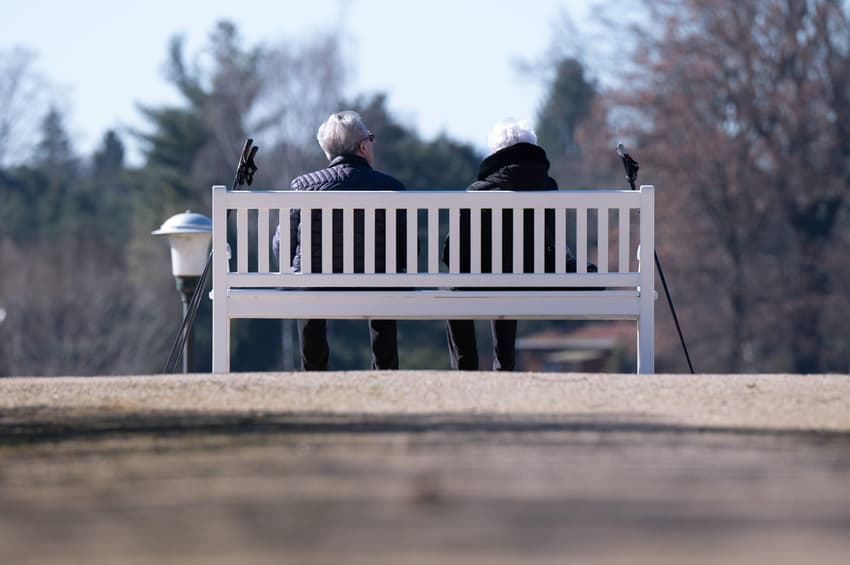German government scraps exemption for over-80s in controversial heating law

Germany's coalition government has scrapped a planned exception for the over 80s on a controversial law that will require homeowners to switch to eco-friendly energy to heat their home rather than oil and gas.
Under the proposed new rules, homeowners will need to install low-emission heating systems like heat pumps and solar energy by 2045 at the latest, while many households will need to do this much earlier.
The bill, which has been dubbed the Heizungsgesetz (heating bill) in the German media, is welcomed by environmentalists but has been met with fear and confusion by many in Germany who are worried about the high costs of switching to new heating systems.
Although the government is planning to provide financial support to households, there is still confusion around the details. The plans and surrounded controversy are believed to be fueling support for the far-right AfD, which along with the centre-right CDU and CSU strongly opposes the measures.
PODCAST: German summer traditions explained and what does the AfD vote win mean for Germany?
Originally, the coalition - made of the Social Democrats, Greens and Free Democrats - had planned a carve-out that would mean people over the age of 80 wouldn't have to face the upheaval and costs of installing a new heating system that meets the 65 percent green energy requirement - even if their current heating system was beyond repair.
However, this exemption has been scrapped in the latest version of the draft bill.
FDP parliamentary group vice chairperson Carina Konrad told DPA that "the proposed age limit of 80 would not be constitutionally sustainable".

Members of the FDP parliamentary group chat in the Bundestag corridors. The FDP forced numerous compromises in the heating bill. Photo: picture alliance/dpa | Bernd von Jutrczenka
Instead, she said, the federal government would ensure that social hardships are cushioned with targeted support as part of a special social component of the law.
The government is planning state subsidies depending on people's income to assist homeowners (and tenants) to make the switch.
Andreas Audretsch from the Green Party said: "We want all homeowners to be able to switch to climate-neutral heating."
READ ALSO: What homeowners in Germany need to know about the heating bill
He said a special subsidy, which will be aimed at people with small to medium incomes, will account for to up to 70 percent of the costs.
For the remaining costs, there will be low-interest loan programs from the KfW bank, he said. "These are also open to anyone who can't get loans on the regular market - including many older people with smaller pensions," he added.
A general hardship clause is also planned, said the Green politician. "Anyone who cannot meet the requirements of the Building Energy Act - regardless of personal circumstances or building-technical issues - can be exempted from the obligations by application," he said.
"This applies regardless of age."
What does the draft law say?
The proposed law will see Germany shift towards heating systems that use more than 65 percent of renewable energy. This will mean a ban on people installing new gas or oil heating systems that don't fit this requirement - unless a gas system can be converted to hydrogen in the future.
Large developers or landlords with multiple properties will have to opt for green energy from January 2024.
However, in the latest version of the law, private owner-occupiers will be given more breathing room to make a decision on how to replace their old heating systems - and local governments will have to play a much bigger role in informing people of their options.
The compromise of the latest draft says that from January 2024 the obligation to install heating systems powered by 65-percent renewables will only apply to new buildings in areas of new residential developments.
In existing buildings, new oil and gas heating systems can continue to be installed until the district in question has presented a plan for the transition to climate-neutral heating. According to a report in Clean Energy Wire, this can include an expansion of district heating.
Large cities have until 2026 to provide this plan while smaller towns have until 2028. However, some districts or cities may do this much faster.
As we mentioned above, financial support from the government will partially depend on income.
For instance all homeowners who install climate-friendly heating systems will get reimbursed for 30 percent of the investment costs, with an additional 30 percent support for people who earn under €40,000 per year.
People who take action to replace their heating system before they have to can also net an additional Klimageschwindigkeitsbonus (Climate Speed Bonus) of 20 percent.
READ ALSO: Reader question: How do I install a heat pump in my German property?

A man sits at a table and counts money. The government is offering significant subsidies for home owners who need to exchange their heating systems. Photo: picture alliance/dpa | Hauke-Christian Dittrich
According to Economics Minister Robert Habeck, the latest changes are currently being written into new legislative texts before they are made available to the Bundestag (German parliament) and the Bundesrat, which represents the German state governments. If the Bundestag passes the law next week - before the summer break - it can come into force next year, as planned.
However, the law has been massively controversial, plunging the coalition into its worst internal crisis since it took office in 2021.
German tabloid Bild has also launched a campaign against the law, dubbing it the "heat hammer", and at times publishing misleading information about the plans.
Comments
See Also
Under the proposed new rules, homeowners will need to install low-emission heating systems like heat pumps and solar energy by 2045 at the latest, while many households will need to do this much earlier.
The bill, which has been dubbed the Heizungsgesetz (heating bill) in the German media, is welcomed by environmentalists but has been met with fear and confusion by many in Germany who are worried about the high costs of switching to new heating systems.
Although the government is planning to provide financial support to households, there is still confusion around the details. The plans and surrounded controversy are believed to be fueling support for the far-right AfD, which along with the centre-right CDU and CSU strongly opposes the measures.
PODCAST: German summer traditions explained and what does the AfD vote win mean for Germany?
Originally, the coalition - made of the Social Democrats, Greens and Free Democrats - had planned a carve-out that would mean people over the age of 80 wouldn't have to face the upheaval and costs of installing a new heating system that meets the 65 percent green energy requirement - even if their current heating system was beyond repair.
However, this exemption has been scrapped in the latest version of the draft bill.
FDP parliamentary group vice chairperson Carina Konrad told DPA that "the proposed age limit of 80 would not be constitutionally sustainable".

Instead, she said, the federal government would ensure that social hardships are cushioned with targeted support as part of a special social component of the law.
The government is planning state subsidies depending on people's income to assist homeowners (and tenants) to make the switch.
Andreas Audretsch from the Green Party said: "We want all homeowners to be able to switch to climate-neutral heating."
READ ALSO: What homeowners in Germany need to know about the heating bill
He said a special subsidy, which will be aimed at people with small to medium incomes, will account for to up to 70 percent of the costs.
For the remaining costs, there will be low-interest loan programs from the KfW bank, he said. "These are also open to anyone who can't get loans on the regular market - including many older people with smaller pensions," he added.
A general hardship clause is also planned, said the Green politician. "Anyone who cannot meet the requirements of the Building Energy Act - regardless of personal circumstances or building-technical issues - can be exempted from the obligations by application," he said.
"This applies regardless of age."
What does the draft law say?
The proposed law will see Germany shift towards heating systems that use more than 65 percent of renewable energy. This will mean a ban on people installing new gas or oil heating systems that don't fit this requirement - unless a gas system can be converted to hydrogen in the future.
Large developers or landlords with multiple properties will have to opt for green energy from January 2024.
However, in the latest version of the law, private owner-occupiers will be given more breathing room to make a decision on how to replace their old heating systems - and local governments will have to play a much bigger role in informing people of their options.
The compromise of the latest draft says that from January 2024 the obligation to install heating systems powered by 65-percent renewables will only apply to new buildings in areas of new residential developments.
In existing buildings, new oil and gas heating systems can continue to be installed until the district in question has presented a plan for the transition to climate-neutral heating. According to a report in Clean Energy Wire, this can include an expansion of district heating.
Large cities have until 2026 to provide this plan while smaller towns have until 2028. However, some districts or cities may do this much faster.
As we mentioned above, financial support from the government will partially depend on income.
For instance all homeowners who install climate-friendly heating systems will get reimbursed for 30 percent of the investment costs, with an additional 30 percent support for people who earn under €40,000 per year.
People who take action to replace their heating system before they have to can also net an additional Klimageschwindigkeitsbonus (Climate Speed Bonus) of 20 percent.
READ ALSO: Reader question: How do I install a heat pump in my German property?

According to Economics Minister Robert Habeck, the latest changes are currently being written into new legislative texts before they are made available to the Bundestag (German parliament) and the Bundesrat, which represents the German state governments. If the Bundestag passes the law next week - before the summer break - it can come into force next year, as planned.
However, the law has been massively controversial, plunging the coalition into its worst internal crisis since it took office in 2021.
German tabloid Bild has also launched a campaign against the law, dubbing it the "heat hammer", and at times publishing misleading information about the plans.
Join the conversation in our comments section below. Share your own views and experience and if you have a question or suggestion for our journalists then email us at [email protected].
Please keep comments civil, constructive and on topic – and make sure to read our terms of use before getting involved.
Please log in here to leave a comment.